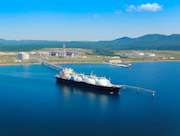Their main advantage is the option of using liquefied natural gas (LNG) as the primary fuel for the main and auxiliary power units. Compared to standard fuels such as marine fuel oil and diesel, LNG can significantly reduce the vessel’s greenhouse gas emissions into the atmosphere.
Korolev Prospect and Vernadsky Prospect tankers will carry Sakhalin Blend oil to the Asia Pacific region. The Aframax size vessels of 114 000 tonnes deadweight each comply with the latest safety requirements, meet Russian and international environmental standards, maritime equipment and energy efficiency requirements, and have a high ice class enabling efficient operation in winter conditions. Additionally, the vessels will be equipped with manifolds to take in natural gas fuel from the Prigorodnoye production complex LNG jetty.
Signing the agreements, Roman Dashkov, Sakhalin Energy’s CEO, stressed: “This result comes after five years of Sakhalin Energy’s meticulous efforts in actively analysing the market, studying trends, and anticipating the future demand for increased focus on the environmental protection and carbon footprint reduction. The agreement that we signed today logically stems from this anticipation and puts our long-term strategy into practice”.
According to Igor Tonkovidov, Sovcomflot President and CEO, Sovcomflot Group highly appreciates the years of mutually beneficial cooperation with Sakhalin Energy. “The documents signed today drive our partnership to a whole new level. SCF is regularly expanding and upgrading the fleet of vessels involved in the Sakhalin-2 project improving its efficiency and safety. We are particularly pleased that the use of green tankers at the Sakhalin-2 project will reduce the carbon footprint of shipping in the Far Eastern basin. Signing the new long-term time charters will support the SCF-2025 strategy”.


